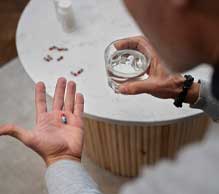Delusional disorder is a mental health condition characterized by the presence of persistent, false beliefs despite evidence to the contrary. These false beliefs, known as delusions, are often irrational and impervious to reasoning. This disorder significantly impairs an individual’s ability to function in daily life and can lead to strained relationships and social isolation. In this article, we will explore the different types of thematic delusions associated with delusional disorder, the diagnostic process, and available treatment options.
What is Delusional Disorder?
Types of thematic delusions
Erotomaniac Delusions:
Persecutory Delusions
Somatic Delusions
Grandiose Delusions
Grandiose delusions involve an exaggerated sense of
Jealous Delusions
Diagnosis of Delusional Disorder
Treatment options

Psychotherapy
Psychotherapy, particularly cognitive-behavioural therapy (CBT), is a

Medication
Antipsychotic medications, such as olanzapine or risperidone, may be

Hospitalization
In severe cases where individuals pose a risk to themselves or others,
